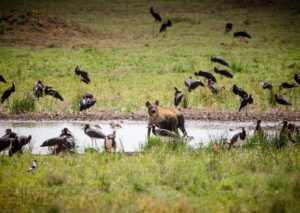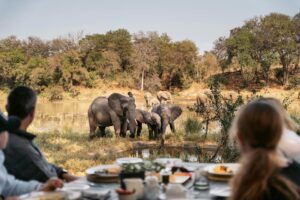How Much Does an African Safari Trip Cost?
An African safari trip is one of the most exciting adventures anyone can experience. Imagine seeing lions, elephants, and giraffes up close in their natural habitat! If you’re planning a safari, it’s important to understand the costs involved. In this blog, you’ll learn about the different factors that affect the price of an African safari and how to budget for this dream vacation.
Factors That Affect the Cost of African Safari Vacations
When thinking about the cost of African safari vacations, several factors come into play. Each of these factors can change how much you’ll need to spend, so it’s good to know what to expect.
Type of Accommodation
One of the biggest expenses on a safari trip is accommodation. Safaris offer a wide range of options, from luxury lodges to basic camping. Staying in a luxury lodge, where you have all the comforts of home, will obviously cost more than camping under the stars. The type of accommodation you choose will depend on your budget and the kind of experience you’re looking for.
Luxury lodges can cost upwards of $1,000 per night, offering services like gourmet meals, private guides, and stunning views. On the other hand, budget camping can be as low as $50 per night, providing a more rugged, but still enjoyable, experience. Mid-range options are also available, usually ranging from $200 to $500 per night.
Location of the Safari
The country you choose for your safari will also affect the cost. Different African countries have different price ranges. For example, safaris in Kenya or Tanzania are typically more expensive because they are popular destinations with famous parks like the Maasai Mara and Serengeti. These countries also offer luxury lodges and exclusive experiences, which add to the price.
In contrast, safaris in countries like Zambia or Zimbabwe might be more affordable, though they still offer incredible wildlife experiences. The cost of flights, transportation, and park fees can also vary greatly between countries, so it’s important to do some research before choosing your destination.
Duration of the Safari
How long you want to stay on safari will directly impact the total cost. Most safaris range from 3 to 10 days, but the longer you stay, the more you’ll pay. A three-day safari might cost around $1,500, while a 10-day adventure can be upwards of $10,000, depending on the level of luxury and the activities included.
Time of Year
The time of year you go on safari will also affect the price. The high season, which usually coincides with the dry season (from June to October), is when prices are at their highest. This is because the dry season offers the best wildlife viewing, as animals gather around water sources, making it easier to spot them.
Conversely, during the low season (from November to March), prices drop significantly. The low season is still a great time to visit, especially if you’re on a budget. While the wildlife may be more spread out, the landscapes are lush and green, offering a different, yet equally beautiful, experience.
Additional Costs to Consider
Apart from accommodation, location, and timing, there are other costs to keep in mind when planning your African safari trip. These additional expenses can add up quickly if you’re not careful.
Park Fees
Every national park charges entrance fees, and these vary depending on the park and the country. For example, entrance fees for the Serengeti in Tanzania can be around $60 per person per day, while parks in South Africa may charge as little as $15 per person per day. If you’re visiting multiple parks or spending several days in one, these fees can quickly add up.
Flights
International flights to Africa can be quite expensive, depending on where you’re flying from. A round-trip flight from the United States to East Africa can range from $800 to $2,000, depending on the time of year and how early you book. Once you’re in Africa, you’ll also need to budget for domestic flights if you’re traveling between different parks or countries. These flights can range from $100 to $500 per flight, depending on the distance.
Safari Guides and Tours
Another important cost to consider is hiring a safari guide or joining a tour group. Guided safaris are the most common way to experience the wildlife, and the cost will depend on whether you’re part of a group tour or opting for a private guide. Group tours are typically more affordable, ranging from $150 to $500 per day, depending on the size of the group and the level of service.
Private safaris, on the other hand, can be much more expensive, often costing between $500 and $1,500 per day. However, having a private guide means you get a more personalized experience, which might be worth the extra cost if you’re looking for something special.
How to Save Money on Your African Safari Trip
Even though an African safari can be expensive, there are ways to save money without sacrificing too much of the experience. Here are a few tips to help you make the most of your budget.
Travel During the Low Season
As mentioned earlier, traveling during the low season is one of the easiest ways to save money on your safari. Not only will accommodation and park fees be lower, but there will also be fewer tourists, giving you a more peaceful and private experience. While the wildlife may be harder to spot, you can still enjoy the beauty of the African wilderness at a lower cost.
Choose Less Popular Parks
Another way to save money is to visit parks that are less popular but still offer amazing wildlife experiences. While the Maasai Mara and Serengeti are world-famous, there are plenty of other parks in Africa that provide great safari experiences without the high prices. For example, consider visiting parks in Namibia, Botswana, or Zambia, where you can still see the “Big Five” animals (lions, elephants, leopards, buffalo, and rhinos) without paying as much.
Book Early or Last-Minute
Booking your safari early can help you secure lower prices, especially for flights and accommodation. Many safari operators offer early-bird discounts if you book several months in advance. On the other hand, if you’re flexible with your travel dates, you might be able to find last-minute deals as operators look to fill empty spaces on tours.
Conclusion
An African safari trip can be a once-in-a-lifetime experience, but it’s important to plan ahead and budget carefully. The cost of a safari depends on many factors, including the type of accommodation, the location, and the time of year. However, by being flexible with your plans and doing some research, you can find ways to make your dream safari more affordable.














Post Comment